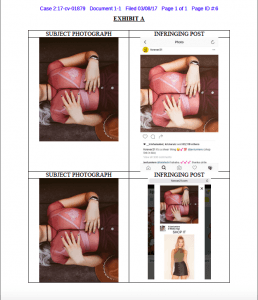Forever 21 is hanging on by a thread after being hit with another copyright laws—this time over an Instagram post.[1] The popular retailer has been sued approximately 50 times over the past several years for copyright infringement, but litigation typically centers around Forever 21 allegedly copying clothing designs from smaller retailers.[2] Forever 21 is now facing a lawsuit after allegedly reposting an Instagram photo without properly crediting the artist.[3]
Vanessa Boy, a Florida-based photographer, filed a suit on March 8, 2017, in the Central District of California, alleging that Forever 21 reposted her Instagram photo, violating her copyright of the photo.[4] The Complaint alleges that Boy posted her photo to her Instagram in August, and was subsequently contacted by Forever 21 requesting to post her photo to their company Instagram account.[5] Boy agreed, but stated that Forever 21 had to repost her photo, and tag and credit her as the photographer.[6] According to Boy, Forever 21 then slightly modified the photo, applying a filter and brightening the photo, and posted the photo as part of click-through advertisement without tagging or giving credit to Boy.[7] Despite contacting Forever 21 several times, Forever 21 never responded or removed the post.[8]
Boy’s claim highlights an issue many artists can face when using social media to promote their work. Instagram’s Terms of Use provide that “Instagram does not claim ownership of any Content that you post on or through the Service.”[9] Thus, each user retains ownership of the photos posted to their handle. Instagram will additionally remove images that infringe on the copyright of another user.[10] However, the Terms of Use do little to protect users when, as is the case here, someone reposts an uncredited, modified version of another user’s post. With this gap in Instagram’s Terms of Use, artists have to seek legal remedy in order to get relief.
Courts then have to determine whether the infringing party had access to the image and whether the modifications made to the photo surpass the standard of substantial similarity.[11] In this case, it is clear that Forever 21 had access to Boy’s image if, as the Complaint alleges, Forever 21 initially contacted Boy about reposting the photo. This case will thus likely hinge on whether or not the Court finds that Forever 21 sufficiently modified the photo so that an ordinary observer would be unable to recognize a “substantial similarity” between the two images. Because the modified photograph includes only minor alterations to the lighting through the filter, it seems unlikely that it will surpass this standard.

